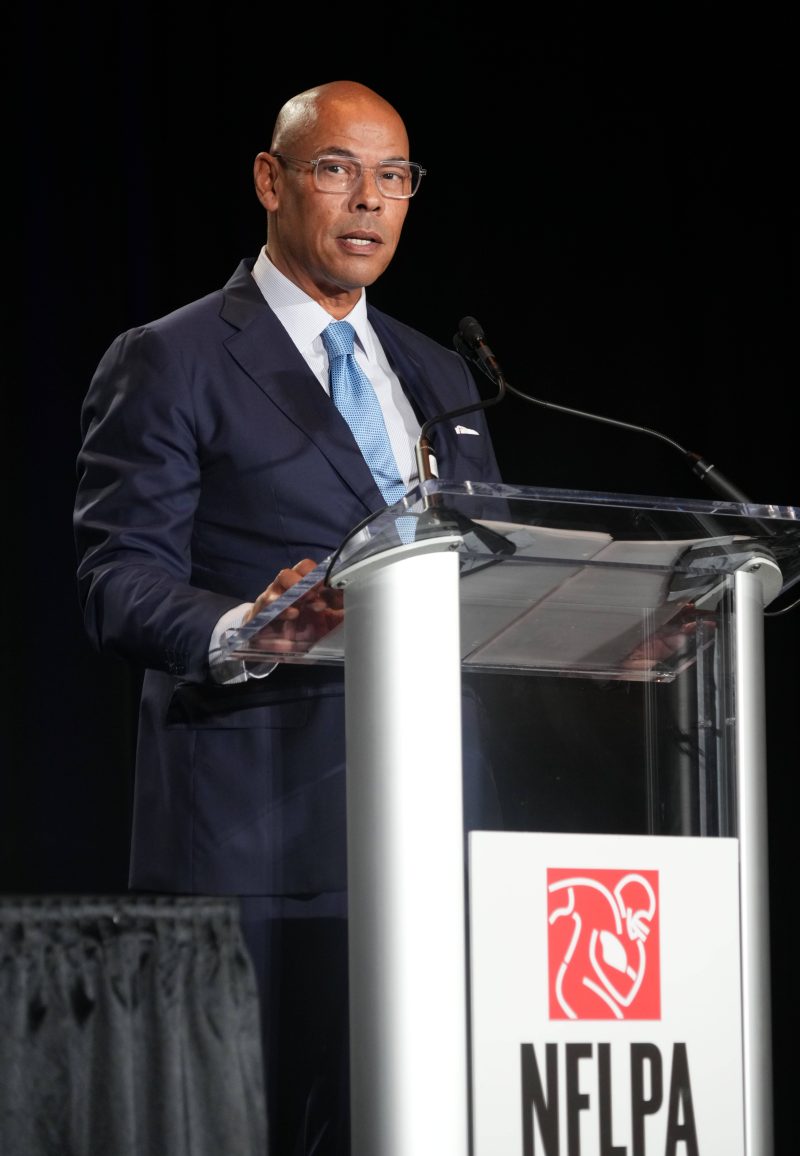
That the NFL Players’ Association ended up here — with their leader, Lloyd Howell, resigning amid multiple scandals Thursday — shouldn’t be a surprise.
When you marry secrecy, you get secrets. And, well, Howell’s NFLPA had some secrets.
Essential reporting from Pablo Torre and Pro Football Talk’s Mike Florio unearthed the initial ruling. ESPN’s Kalyn Kahler and Don Van Natta Jr. added layers by exposing a secrecy agreement between the NFL and NFLPA to keep the arbitration ruling buried.
What should have been a slam dunk for Howell and his union inexplicably became a “nothingburger.” If only his tenure could be described that way. “Disaster” is a better fit. “Unhealthy” is more apropos.
For the players, who rely on this union even though the vast majority of them don’t really care about the details of the membership. For the fans, the vast majority of whom support the players’ rights to receive their fair share in the fight against 32 separate, billion-dollar enterprises — and don’t want to hear about collective bargaining agreement (CBA) drama.
You think this stuff doesn’t have consequences? Look at the second-round draft picks from the 2025 class fighting for guaranteed money. Every day is a scrap for the next cent in the NFL. The NFLPA’s job is to give each player a chance in that battle.
Howell was elected following a process that was shrouded in secrecy. None of the candidates were made public. Player membership received one day’s notice of the election, according to reports, and only 11 individuals voted. And the outcome was Howell, a former executive at consulting firm Booz Allen.
Former union president JC Tretter, now the chief strategist for the NFLPA, said the process was copacetic and within the union’s constitutional guidelines. This is a group that represents nearly 1,700 active players and many more former ones. Maybe Howell was the most qualified candidate and presented the best vision for the NFLPA’s future — not that the public (or many of the players) would have any idea. But it set the tone for the next two years.
Once the dam broke for Howell, there was no plugging it. After Torre’s initial revelation, the confidentiality agreement between the league and union came to light. Then Torre reported another grievance case that went to arbitration — this time with a judge ruling against the union that Tretter’s comments on a podcast in 2023 violated the CBA for loosely suggesting players could use injuries as leverage. The NFL won that arbitration ruling, but nobody knew because of a different confidentiality agreement.
One of the most egregious points of Howell’s time leading the union is that he was a paid, part-time consultant for The Carlyle Group — one of the private-equity firms approved by the league to invest in NFL franchises. Conflict of interest and grift are en vogue in America in 2025. That doesn’t make any of this OK. The union head must be unequivocally committed to being on the side of the players. This is a role that requires servant leadership. Focusing on adding zeros to checking accounts and diversifying investment portfolios don’t mesh with that.
Those are the controversies relevant to Howell’s dealings at the NFLPA. And the union stood by Howell, even releasing a statement of support from the executive committee four days before his resignation. It was his choice to resign, according to a source with knowledge of the situation. The person did not want to be identified because of the sensitivity of the situation.
The final nail in the coffin appeared to be the ESPN report that he was involved in a sexual discrimination and retaliation lawsuit at his former job in 2011. Per ESPN, some players who voted for Howell were unaware of the suit. One month after his election, Howell’s firm settled a $377 million lawsuit with the government after a whistleblower claim of overcharging. Howell was the company’s chief financial officer.
Perhaps a proper, public vetting process could have prevented this.
Some good certainly happened at the NFLPA under Howell. The player surveys were a hit and led to tangible change, with owners prompted to improve life and conditions for the players and their families.
The timing for the union is not ideal. The CBA expires in 2030, and that may feel distant. Labor negotiations have a funny way of making any timeline feel clustered. The work to avoid labor strife down the road had already been started. The new leader won’t have to start from scratch, but Howell’s resignation definitely puts the union behind the 8-ball in what is already an unfair fight against ownership.
Howell was never the right choice for the job. The original sin, though, is the secrecy of his selection. Hopefully the NFLPA has learned that lesson.
